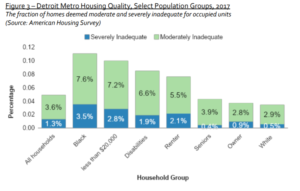A Decent Home: The Status of Home Repair in Detroit
Download PDF of full working paper
By Ryan Ruggiero, Josh Rivera, and Patrick Cooney
Introduction
In 1945, President Truman told Congress, “A decent standard of housing for all is one of the irreducible obligations of modern civilization.” Seventy years later, this ideal of a decent home for every American has still not been achieved, with nearly 6 million homes in the U.S. deemed inadequate. Though Truman’s words were lofty, federal policies at the time only sought to extend this “irreducible obligation” to white Americans, and racial disparities in housing quality today are large and persistent.
Home repair programs can serve as a critical tool to support housing stability and promote racial equity, particularly in Rust Belt cities with an aging housing stock and large populations of Black residents who have consistently faced structural racism in the U.S. housing system. In Detroit, a mostly Black city, old housing stock coupled with high poverty rates and an aging population intensifies demand for home repair and home accessibility modifications. As we explore in this report, however, current home repair efforts cannot meet this demand. Fixing this gap has taken on new urgency as the COVID-19 pandemic has underscored the importance of housing stability and the connection between housing and health outcomes.
This report examines the current state of the home repair ecosystem in Detroit, identifies potential gaps in the system, and provides a scan of promising practices in cities across the Midwest. A central finding of our analysis, however, is that reforms to existing programs will not be enough to meet the needs of Detroit residents. To truly meet the needs of a city faced with old homes and low incomes, more resources are needed.

Conclusion
Addressing the home repair needs of both homeowners and renters in Detroit requires a coordinated, cross-sector, collaborative effort that maximizes the impact of current programs. But it also requires resources. Aging housing stock and low incomes are two risk factors that increase the likelihood and severity of repair needs. In Detroit, nearly 80% of the occupied residential structures were built prior to 1960, and roughly one-third of residents live under the poverty line. Families living in inadequate housing who are unable to afford repairs may eventually have no choice but to abandon their homes to escape housing problems such as leaky roofs, rodent infestation, inadequate heating, or mold. High rates of inadequacy in rental housing magnifies the need to invest in home repair for low-income homeowners as a way to maintain adequate, affordable housing units and build wealth.
The repair needs in Detroit are significant, and our analysis of data from the American Housing Survey and Detroit’s home repair ecosystem suggests current resources devoted to home repair don’t come close to meeting the need. The City of Detroit and a network of community partners can surely make necessary reforms to help stretch the impact of available dollars and provide a more seamless experience for those with home repair needs. But in order to make a real and lasting impact on the quality of Detroit homes, more philanthropic and federal resources are required.
Indeed, a compelling case can be made for federal action. In the 1940s, ‘50s, and ‘60s, the federal government subsidized the development of suburban homes across the country, solely for white
people. At the same time, Black Americans had to fend for themselves in cities like Detroit, often purchasing homes through predatory land contracts which robbed them of the wealth-building possibilities of homeownership. Robust federal support for home repair in aging industrial cities like Detroit could give thousands of Black households the opportunity to secure safe and affordable housing, and perhaps even set the stage for the wealth creation. Such a measure would be far from sufficient to rectify the damage done by our history of racially discriminatory housing policies, but it would be a step in the right direction.
A decent home for all was our obligation in 1945, and it remains our obligation today. With innovative new programs, cross-sector collaboration, and an influx of resources dedicated to home repair, we can make great progress towards fulfilling this obligation.
